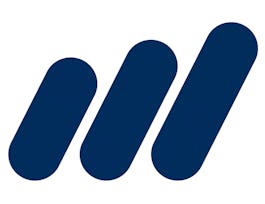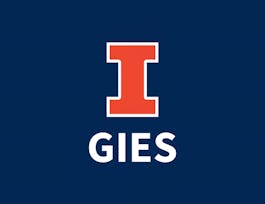By taking this course, students will learn the role played by financial intermediaries in modern economies, their vital role to finance investments and the sources of risk associated with such intermediation activity. The course is structured to provide students with both theoretical notions, through the derivation of models developed by the literature, and empirical application, that are based on real data analyses.



Financial Intermediation
This course is part of Financial Markets Specialization


Instructors: Tommaso Oliviero
Sponsored by InternMart, Inc
Recommended experience
What you'll learn
analyze business models and their impact on the functioning and stability of the banking sector starting from the databases available online;
evaluate the critical issues and specificities of the modern banking system in contexts where the development of the financial market is limited;
apply banking sector innovations in institutions;
identify financial intermediation risks and contribute to long-term economic growth.
analyze banking system effects on market efficiency and stability; evaluate the impact of fintech on financial intermediation.
Details to know

Add to your LinkedIn profile
26 assignments
See how employees at top companies are mastering in-demand skills

Build your subject-matter expertise
- Learn new concepts from industry experts
- Gain a foundational understanding of a subject or tool
- Develop job-relevant skills with hands-on projects
- Earn a shareable career certificate


Earn a career certificate
Add this credential to your LinkedIn profile, resume, or CV
Share it on social media and in your performance review

There are 6 modules in this course
By the end of this week, students will acquire a comprehensive understanding of financial intermediaries and grasp the distinctive role played by banks. They will gain theoretical insights on the function of banks, their objectives, the determinants of profitability and risk in banking activity. To conclude, the lesson will define metrics for assessing performance and risk, drawing insights from banks' balance sheets, income statements, and stock price data.
What's included
14 videos6 readings4 assignments
By the end of this week, learners will be able to construct empirical tests and critically evaluate the results of the causal relationship between financial development and long-term economic growth.
What's included
11 videos8 readings4 assignments
By the end of this week you will learn how to apply the analysis of bank runs to the Global Financial Crisis of 2007-2009.
What's included
24 videos14 readings5 assignments
By the end of this week, learners will be able to analyze the role of the banking sector for the business cycles. In detail, the topics covered in this week regard the transmission channel of monetary policy, the amplification channel of asset prices and banking shocks for the real economy.
What's included
12 videos6 readings4 assignments
By the end of this week, learners will be able to analyze how competition influences banks' exposure to intermediation risks. Additionally, they will understand the implications of bank competition for the emergence of financial crises.
What's included
20 videos13 readings4 assignments
By the end of this week, learners will be able to analyze the recent evolution of FinTech and its impact on traditional banking.
What's included
18 videos10 readings5 assignments
Instructors


Offered by
Why people choose Coursera for their career




Recommended if you're interested in Business

Coursera Instructor Network

University of Michigan

Corporate Finance Institute

University of Illinois Urbana-Champaign

Open new doors with Coursera Plus
Unlimited access to 10,000+ world-class courses, hands-on projects, and job-ready certificate programs - all included in your subscription
Advance your career with an online degree
Earn a degree from world-class universities - 100% online
Join over 3,400 global companies that choose Coursera for Business
Upskill your employees to excel in the digital economy


